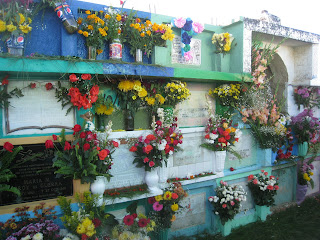I've gotten in the habit of taking the tourist shuttle between my site and Santa Lucia when I travel for Peace Corps business. Caesar, one of the drivers/owners of the shuttle company, is really great with PC volunteers and cuts us a great discount. He also picks me up on the side of the highway outside of my site and takes me directo--it's just so nice not having to worry about changing buses three times, or being the victim of the oh-too-frequent bus robberies.
Yesterday I had arranged to go back on the 2:00pm shuttle, and waited patiently in the burning sun at the Santa Lucia bus terminal. An hour later the shuttle arrived, with a happy Caesar aboard. Upon putting my backpack on the roof, and making sure I was settled in nicely, Caesar casually told me "Alright, I'm going to stay here. You'll be the guide, right Hannah? My friend here who's driving never goes this route so you'll guide him. See you soon!" And with that, he pulled the sliding door shut and off we went. I looked around--a van full of German tourists. I looked at the driver in the rear view mirror, and he caught my eye and said "Caesar says you've done this trip many times. I'll need your help getting through Guate." I laughed, as reality began to sink in. This driver and van full of Germans were counting on me to get them to Coban. Me, one of the most bona fide directionally-challenged women of this century. This is something I know, and that everybody who knows me well enough knows. Back home, I GoogleMap
everything. I still find myself chanting "Never Eat Soggy Waffles" to remember my cardinal directions. I've lived in Chicago my entire life and I still sometimes get on the bus or train going in
the wrong direction.
As I sat there pondering the hilarity of the situation, the driver caught my attention to ask which way to veer in an oncoming fork in the road. Soon enough, I was hanging over the back of the driver's seat, squinting out the windows trying desperately to recognize anything familiar on the side of the Guatemalan freeway. And somehow between the driver's common sense, my recognition of a few key landmarks, and a few desperate calls to Caesar for help, we got out of Guate and onto the main highway, where we started the straight-shot, no-brainer journey up to Coban.
As I sat back and took a sigh of relief, I realized that this seemingly ridiculous situation represented so many other experiences I've had here as a PC volunteer. So often here I've found myself back-seat driving for a Guatemalan on a route that I only know a little bit better than he or she. I've found myself having to put on my expert hat in so many situations in which I've felt as far from a expert as possible. I've "taught" Guatemalan women how to use a dutch-oven when it was only the second time ever using one myself. I've taught middle-school lectures on self-esteem and goal-setting when I often question how well I do these things in my own life. Construction workers have asked my approval on bottle-walls that were as new a concept to me as they were to them. So much of my service here boils down to just that: back-seat driving on a route that I only
sort of know. I came here 18 months ago an expert in absolutely nothing. But what I did come with was a willingness to learn, adjust, and go with the flow. And with that, a bit of luck, and access to a plethora of resources, all I can do is just hope that my Guatemalan counterparts and I reach our destination together. Or at least come a little bit closer to it that we were before.





